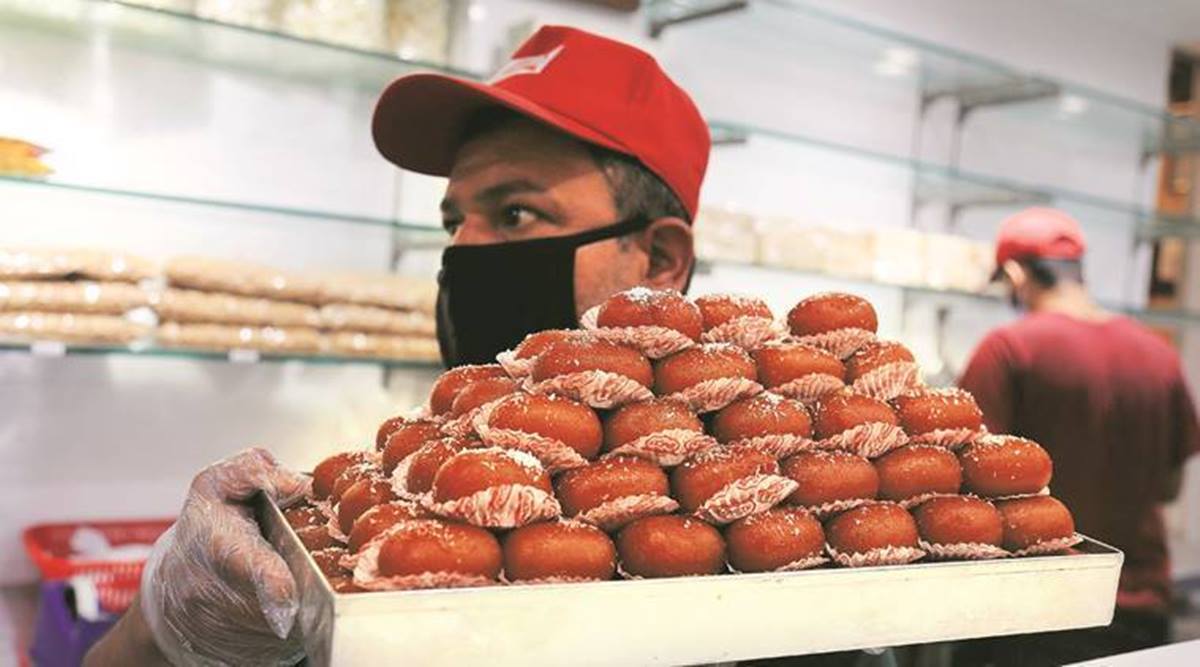Calcium Carbide, a carcinogen, is widely used to ripen mangoes quickly.
Tension prevailed at the Kothapet fruit market in Hyderabad after authorities cancelled the licences of 91 shops on Monday, stating that they were using fruits artificially ripened with carbide.
Meanwhile, in another part of the city, the Greater Hyderabad Municipal Corporation (GHMC) imposed penalties on five hotels, and sealed another, for unhygienic conditions.
Both these raids were in response to a much larger problem that the city faces: Food safety.
Unstamped meat
On Sunday, when officials raided mutton and beef shops along with malls to check for meat quality, they found that Forum Mall in Kukatpally, was using unstamped meat, and fined them Rs 20,000.
Earlier this week, 69 hotels had been raided by the municipal body, of which 54 were reportedly using stale meat and had dirty kitchens.
Since the first week of April, the GHMC has
appealed to all eateries across the city, to only use meat from notified slaughter houses, which are monitored, and maintain a better quality.
"It is a public–private partnership and the GHMC issues permission to private agencies to build and run these notified slaughterhouses, in accordance with our norms and rules. Therefore, we can be sure that the meat from here is healthier," Dr B Palavan Kumar, the GHMC's Health Wing in-charge of Secunderabad, Malkajgiri and Begumpet told TNM.
However, since this meat is costly, several eateries make their purchases from local butchers, thereby putting public health at risk.
Officials also say that in many places, they found meat that was stored in unhygienic conditions for more than a week, while the ideal norm is one day storage.
There are several departments that deal with the issue of hygiene and sanitation of eateries. The GHMC's health department is one of those, mainly dealing with kitchen hygiene. This involves things like flooring, painting, utensils being used, storage, personal hygiene of workers etc.
While it is hard for a customer to tell the difference between stamped meat and unstamped meat once it is cooked, Dr Kumar says that one could still ask for a receipt.
"We issue a receipt when any restaurant or eatery buys from a notified slaughterhouse, and customers can demand to see that bill, if they feel that the meat is stale, or not up to the mark," he says.
Often, officials levy a heavy penalty on the eateries, or in some cases, shut them down until they are willing to refurbish the premises.
Artificially ripened fruits
With the incident at the Kothapet market on Monday, another long-standing problem that Hyderabad faces was highlighted.
Calcium Carbide is a dangerous and corrosive chemical used to make fertilizers, and it is known to have carcinogenic properties. Despite this, it is still widely used to ripen mangoes quickly.
With summer approaching, farmers tend to pluck mangoes early as they need to be transported to the market. Once it is in the market, mango traders ripen them artificially to clear their stocks sooner.
Moreover, the fruits look more attractive when they are artificially ripened, garnering more consumers.
The chemical is also used to ripen fruits like bananas. However, the substance is extremely harmful, and may cause cancer, permanent eye damage, ulcers and even lung issues.
In 2015, a bench of the Hyderabad High Court had called those who used the carcinogen to artificially ripen fruits, 'worse than terrorists.'
"For earning some extra rupees, you are putting scores of lives at risk. Such traders are worse than terrorists, killing generations of people with slow poison," the court
had said.
Moreover, artificial ripening of fruits is banned under the Food Safety and Standards Act (FSSA), 2006.
According to
reports, those who do indulge in this practice can also be booked under IPC Sections 272, 273 (food adulteration) and 420 (cheating), which are all non-bailable sections.
Despite this, the farmers and the traders claim that they have no other choice.
A safer and legal way to speed up the ripening process of fruits is to gas them with ethylene, a natural ripening agent.
While the state has provided the farmers with ethylene chambers at the Kothapet market, traders
reportedly couldn't find slots for their fruits, and succumbed to artificial ripening.
Officials also say that it is very hard to identify these fruits.
As a general precaution, one thing to look out for is that they may look ripe on the outside, but are usually still unripe or ripening inside, when they are cut open.











